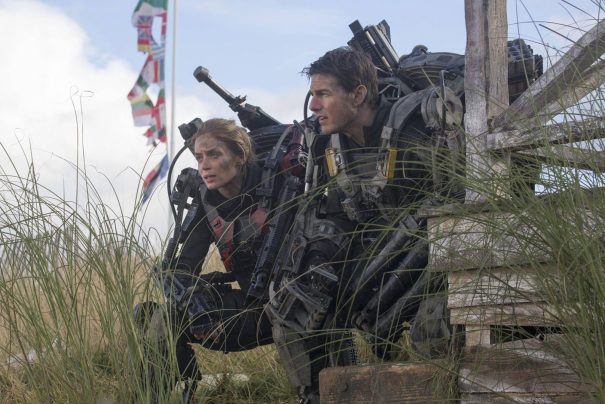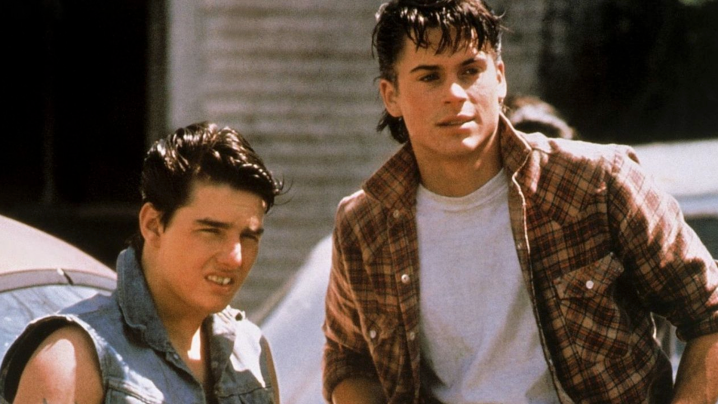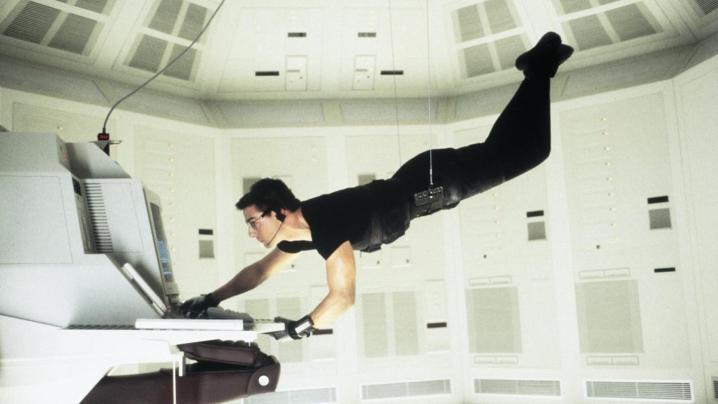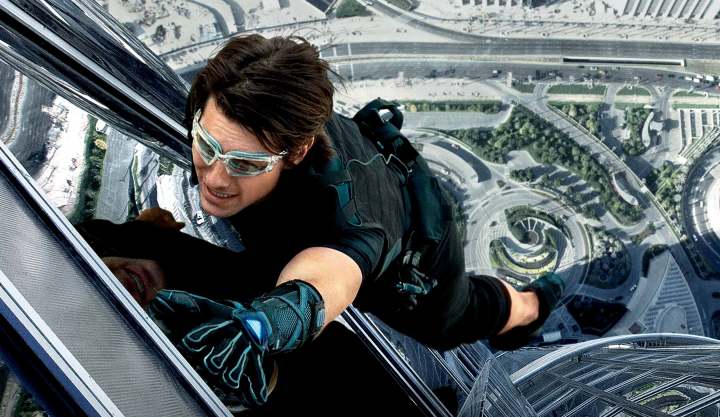Given the kind of movies Tom Cruise is best known for, it’s a little amazing to realize that he didn’t become an action star until the mid-1990s. Sure, he had made Top Gun (1986), which showcases thrilling aerial combat sequences, but for the first 15 years of his career, the actor appeared primarily in dramas — Taps, All the Right Moves, The Color of Money, Rain Man, Born on the Fourth of July, Days of Thunder, and Far and Away, among others. For the most part, he wasn’t engaged in hand-to-hand combat, death-defying stunts, saving the world from charismatic adversaries, or what he has become most famous for onscreen: Running.
But the 1990s saw Hollywood pivot hard toward action movies and suddenly every top male star, regardless of what kind of films they typically appeared in, was expected to make them. Thus Cruise joined the likes of Nicolas Cage, John Travolta, Keanu Reeves, Will Smith, Wesley Snipes, and many others. Since then, Cruise has become primarily an action star, with his more dramatic roles relegated to the past (the last of his three Oscar nominations was in 2000 for Magnolia). As we celebrate the recent release of Top Gun: Maverick and await the upcoming two-part Mission: Impossible – Dead Reckoning, we break down the actor’s action highlights into three main categories: Sci-fi action, crime thrillers, and, of course, Mission: Impossible movies.

Sci-fi action
Cruise didn’t make a science fiction film for the first two decades of his career, then made five of them between 2001 and 2014. The first, Cameron Crowe’s Vanilla Sky (2001), reunited Cruise with his Jerry Maguire director for the remake of the 1997 Spanish film Abre los ojos (Open Your Eyes). Though the movie had sci-fi elements, it was more of a psychological thriller. His next four sci-fi outings after that — Minority Report (2002), War of the Worlds (2005), Oblivion (2013), and Edge of Tomorrow (2014) — were all bona fide big-budget action epics.

The most critically successful was Steven Spielberg’s Minority Report, with Roger Ebert naming it the best movie of 2002, among other raves. Cruise stars as Chief John Anderton, a detective at Pre-rime, a unit that uses “precogs” (humans with special abilities to see the future) to determine who is guilty of future murders. Anderton is a faithful believer in the infallibility of the process until he himself is accused of murdering someone he’s never even met. This leads to his flight from the authorities as he tries to unravel the conspiracy that has targeted him.
The film features some of the most inspired set pieces in the Spielberg canon, including a thrilling jetpack chase and a sequence in which robot surveillance spiders flood a tenement, marauding all over people’s privacy as they search for Anderton. But the movie’s success is due to more than its superior action, special effects, and world-building. Spielberg also explores compelling Orwellian themes about how easily fascism can creep into a society.

After the success of Minority Report, Cruise and Spielberg reteamed for War of the Worlds (2005), released during a time when the star’s usual bulletproof publicity started taking a hit. The famous “dancing on Oprah’s couch” incident, during which Cruise proclaimed his love for new flame Katie Holmes, had the press openly questioning his mental health, and there were concerns that the incident hurt the film’s box office. Despite the PR flak, the movie was a solid hit. Like Minority Report, it features some brilliant filmmaking, particularly during a sequence when the aliens attack a Hudson River ferry.
While Oblivion, a postapocalyptic tale co-starring Morgan Freeman, was panned by critics and unloved by audiences, the following year’s Edge of Tomorrow earned glowing reviews, and its reputation has only grown in the intervening years. Yes, it blatantly rips off Groundhog Day in its story of a soldier played by Cruise who is forced to relive the same grueling day over and over until he makes all the right choices to save the world from an alien invasion. But by this point, the “live, die, repeat” format has become its own mini-genre (see Palm Springs with Andy Samberg for another excellent example).

Anyway, who cares when a movie is this inventive and entertaining? The special effects are spectacular and Cruise isn’t afraid to play a character who starts off as a coward and deserter before only gradually becoming heroic. Most movie stars would be too worried about their image to play that particular arc, but part of the secret to Cruise’s onscreen success is that he has never been afraid to play a jerk. Here, as with the drug-using Anderton in Minority Report, the character is more interesting for his flaws, not less.
Several of Cruise’s upcoming films listed on IMDB are also sci-fi, or at least space-based, including an announced sequel to Edge of Tomorrow, and something intriguingly titled “Untitled Tom Cruise/SpaceX Project,” in which Cruise and Edge of Tomorrow director Doug Liman “travel far beyond Earth to film the first-ever Hollywood motion picture in outer space.” Filming a movie in space? If any actor is committed enough for such a project, it’s Cruise.

Crime thrillers
Though crime movies haven’t been Cruise’s bread-and-butter, he has made a handful of popular and well-regarded entries in the genre throughout his four decades of stardom, including one of his first films, Francis Ford Coppola’s The Outsiders. Chronicling the friction between a ’60s “greaser” gang and their more well-to-do high school counterparts in Oklahoma, the movie became famous for the number of young actors in the cast who went on to become stars. In addition to Cruise, the movie also features Matt Dillon, Patrick Swayze, Ralph Macchio, Emilio Estevez, and Rob Lowe.
Cruise himself became the biggest star of the bunch and had a stellar run through the 1980s before a few of his early ’90s films — Days of Thunder and Far and Away — failed to ignite at the box office. But audiences didn’t stay away for long, flooding back into theaters for a pair of crime thrillers that became huge hits in 1992 and 1993. The first, A Few Good Men, directed by Rob Reiner, stars Cruise as a JAG lawyer who tries to prosecute a Marine Colonel (Jack Nicholson) who may be covering up crimes at the base he commands. The movie instantly entered the zeitgeist for the immortal moment when Cruise bellows, “I want the truth!” and Nicholson responds, “You can’t handle the truth!” The exchange was burned into the popular consciousness when A Few Good Men ran endlessly on basic cable for years after its release.

Less than a year later, the actor appeared as another lawyer in Sydney Pollack’s adaptation of John Grisham’s massive bestseller The Firm. Cruise’s megawatt smile was this time put in the service of playing Mitch McDeere, a naïve young lawyer who gets a too-good-to-be-true job at a prestigious law firm right out of school only to find out that it’s all, well, too good to be true. Though The Firm has faded in the collective memory compared to A Few Good Men, the movie was mostly well-received at the time, particularly because of the starry cast that includes Gene Hackman, Holly Hunter, Ed Harris, David Strathairn, Hal Holbrook, Gary Busey, and the kindly oatmeal salesmen himself, Wilfred Brimley, as an evil henchman that Cruise famously beats the snot out of.
Among the most critically acclaimed of Cruise’s crime films was Michael Mann’s Collateral (2004). Cruise, ever mindful of working with the best directors (Coppola, Martin Scorsese, Spielberg, Stanley Kubrick, Brian DePalma, etc.), this time teamed up with Mann (Heat, The Insider) at the tail end of a fervent creative stretch for the director. The big news about Collateral was that Cruise played the villain to Jamie Foxx’s reluctant hero. His assassin character, Vincent, is a complete nihilist who has talked himself into believing that his philosophical ideas about the nature of human life justify murder. Really, he’s just a psychopath. When Foxx realizes this, he has to discover it within himself to stop this monster and save an imperiled U.S. Attorney (Jada Pinkett Smith).

Cruise returned to playing a hero of popular novels in his two Jack Reacher films, which were only mildly successful, especially compared to the popularity of the recent Amazon show based on the character. More successful was American Made, directed by Liman, with Cruise playing real-life pilot Barry Seal, a hustler who flew drugs for the Medellín Cartel while simultaneously working for the CIA. Critics praised the brisk story and the way tension escalates as Barry tries to stave off the inevitable consequences of his situation. But reviewers especially appreciated the return of the kind of cocky and charming character Cruise regularly played in his pre-action hero days before he started battling grim end-of-the-world stakes every time out. It’s a loose and confident performance and the movie is a lot of fun.

Mission: Impossible franchise
Of course, the Mission: Impossible films could be considered crime thrillers of a sort, with Cruise leading an Interpol-style outfit against the world’s most megalomaniacal villains. The franchise leaned more fully into this in the first outing and even brought on a director known for making crime films in DePalma (The Untouchables, 1983’s Scarface, Dressed to Kill). Mission: Impossible contains its share of action and stunts, but it’s quaint compared to what the series would become. In James Bond terms, it’s the Dr. No of the franchise, laying out the basic template, then giving way to the supercharged action and pacing of later entries.
Cruise, always a savvy chooser of directors, went with Hong Kong legend John Woo for Mission: Impossible II (in 2000) at a time when Woo was having a nice run in Hollywood, having made Face/Off and Broken Arrow. Alas, the movie didn’t quite work, despite the always welcome presence of Thandie Newton. Mission: Impossible III, directed by J.J. Abrams, followed to a so-so reception and the franchise’s worst bo- office performance. Cruise then reinvented the franchise with the fourth film, Ghost Protocol (2011), which featured the famous stunt in which he scales world’s tallest building, the Burj Khalifa in Dubai.

Ghost Protocol earned raves and the franchise has since become as famous for its quality as for the massive globe-spanning productions and-mind boggling stunts that are often performed by Cruise himself. Ghost Protocol and its two follow-ups, Rogue Nation (2015) and Fallout (2018), are all among Cruise’s best-reviewed films, with each earning more than 90% on Rotten Tomatoes.
Given how amazing the trailer looks for Dead Reckoning – Part 1, it’s likely that Cruise will give audiences at least a few more amazing action films before he puts away his running shoes for good.



